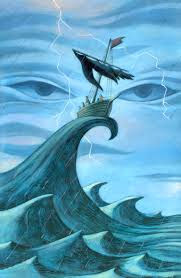Inherent Evil and Lack of Virtue in Lippard's Black Andy--as well as almost every other characte
- The Tempest
- Apr 9, 2016
- 3 min read

Although many scholars would argue that Lippard's character Black Andy, more readily referred to as The Bulgine, or the Negroe in The Killers (1849), is a virtuous hero who dies after rescuing Kate from the burning building, this scholar would argue that although Lippard attempts to paint this character as noble and worthy of positive light, he actually reflects a subdued version of villainy prevalent in the other main characters of the novel.
At the beginning of the story, we are introduced to two of the main villains in the story, Cromwell and Don Jorge, two individuals who are portrayed as privileged or angrily described as "ashamed to work, and had no disposition to earn its wages by one effort of honest toil (Lippard 29). Later, we are introduced to Black Andy, the proprietor of a brothel or bar of some sort, whose main clientele are the dregs of society--prostitutes, solicitors, and later we learn even some of the despised Killers, whom he readily serves without objection. In comparison to our heroine Kate, then, Black Andy could be easily seen as another element of the suppressive male culture that dominated Philadelphia at the time, ad less of a indoctrination of only Caucasian (Anglo-Saxon) culture. Black Andy readily accepts patrons of any kind, regardless of their status as criminals or thugs. We meet Black Andy in part X when Cromwell solicits him to arrange the kidnapping of Kate. He's seen conversing with a customer, who is described as a loafer, and who we later find out to be one of the Killers who to Black Andy, is being annoying. We are not sure what to make of this, but when Cromwell asks the Bulgine to partake in the kidnapping, he gladly agrees. It is difficult to assign virtue to a character who will readily partake in a crime for seemingly no gain but money, and his compliance in the deed suggests he is a part of the villainous culture that pervades the people of Philadelphia (not just the Caucasians, but the blacks too.) After Cromwell leaves, the Bulgine is then proceeds to approach the loafer and "kicked him with his splay foot (Lippard 50). This subtle (albeit ineffective) attempt to show the empowerment of black characters in the story only serves to isolate the Bulgine as a morally questionable character as well, and may ultimately subtly reinforce the powerlessness of blacks and the impotence they demonstrated throughout the time period.
The next example of the Bulgine's evil occurs in part XV, when he assaults (chloroforms) Kate and kidnaps her. We later find out it was under orders of "The Gentleman" whom we later find out is Jacob Hicks. Regardless of who employs him, if Lippard wanted to chronicle the virtuosity of Blacks, why paint the Bulgine in such a negative light? This scholar feels that Lippard was obviously addressing the systemic failure of a society ridden with selfish-intent, and that this self-seeking villainy was pervasive in blacks as well. Every male character in the story develops plans to seek riches or revenge on various characters in the story. Black Andy is no exception corruption and villainy. Athoughhe attempts to rescue Kate at the end, he fails because he is an inherently evil character, and Lippard sends the distinct message that the corrupt evilness of these individuals can only end in their own demise. Although many liberal scholars make the simple-minded argument that Andy is to be considered a hero for confronting the killers and attempting to save Kate, it's ultimately his futility and impotence that accentuates his character, and could actually be seen as an example of the 18th-century perception of the "flawed genetics of the Negro race" that was so pervasive at the time.
Lippard, George. The Killers: A Narrative of Real Life in Philadelphia By a Member of the Philadelphia Bar. 1850. rpt: etext Virginia.edu






Comments